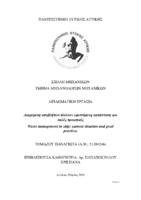| dc.contributor.advisor | Papapostolou, Christiana | |
| dc.contributor.author | Τομάζου, Παναγιώτα | |
| dc.date.accessioned | 2024-03-29T10:51:05Z | |
| dc.date.available | 2024-03-29T10:51:05Z | |
| dc.date.issued | 2024-03-19 | |
| dc.identifier.uri | https://polynoe.lib.uniwa.gr/xmlui/handle/11400/6268 | |
| dc.identifier.uri | http://dx.doi.org/10.26265/polynoe-6104 | |
| dc.description.abstract | Η παρούσα βιβλιογραφική έρευνα επικεντρώνεται στη διαδικασία παραγωγής, συλλογής και διαχείρισης των αποβλήτων των πλοίων επί των αυτών, κάτω από ποιες συνθήκες απορρίπτονται στη θάλασσα, και σε ποιες περιπτώσεις πρέπει να παραδίδονται στις λιμενικές εγκαταστάσεις υποδοχής αποβλήτων για περεταίρω επεξεργασία. Σκοπός της εργασίας είναι ανάλυση της παραπάνω μεθοδολογίας και η ανάδειξη καλών πρακτικών, εάν αυτές υφίστανται σήμερα, για τη βέλτιστη διαχείριση των αποβλήτων των πλοίων, με βάση τον τύπο τους και σύμφωνα με τις οδηγίες και τους κανονισμούς που έχει εκδώσει η διεθνής κοινότητα σε συνδυασμό με αυτές που έχει δημοσιεύσει η Ευρωπαϊκή Ένωση και περιέχονται και στην εθνική νομοθεσία. Γίνεται εκτενής αναφορά στη διεθνή σύμβαση MARPOL 73/78 και αντίστοιχα στην ελληνική και ευρωπαϊκή νομοθεσία. Αναπτύσσεται η προέλευση των αποβλήτων των πλοίων, οι διαδικασίες διαχείρισής και αποθήκευσής τους στα πλοία, πότε και πως επιτρέπεται η απόρριψή τους στη θάλασσα, αναφέρονται επίσης οι παράγοντες παραγωγής των αποβλήτων και προσδιορίζονται οι ποσότητες των αποβλήτων ανάλογα με τον τύπο τους αλλά και τον τύπο του κάθε πλοίου. Τέλος, δίνεται έμφαση στην κατάσταση που επικρατεί σήμερα στις λιμενικές εγκαταστάσεις υποδοχής αποβλήτων των πλοίων σχετικά με τη διαχείριση αυτών, στα μέσα που χρησιμοποιούν, αλλά και στις καλές πρακτικές που ακολουθούν λιμένες της Ευρώπης και μπορεί να εφαρμοστούν για τη βελτίωση της διαχείρισης των αποβλήτων των πλοίων, την προστασία του θαλάσσιου περιβάλλοντος και τη μετάβαση σε ένα μοντέλο κυκλικής οικονομίας και στη χώρα μας και πιο συγκεκριμένα στο λιμάνι του Πειραιά. | el |
| dc.format.extent | 119 | el |
| dc.language.iso | el | el |
| dc.publisher | Πανεπιστήμιο Δυτικής Αττικής | el |
| dc.rights | Αναφορά Δημιουργού - Μη Εμπορική Χρήση - Παρόμοια Διανομή 4.0 Διεθνές | * |
| dc.rights | Attribution-NonCommercial-NoDerivatives 4.0 Διεθνές | * |
| dc.rights.uri | http://creativecommons.org/licenses/by-nc-nd/4.0/ | * |
| dc.subject | Απόβλητα πλοίων | el |
| dc.subject | Διαχείριση αποβλήτων | el |
| dc.subject | Λιμενικές εγκαταστάσεις υποδοχής αποβλήτων | el |
| dc.subject | MARPOL | el |
| dc.subject | Θαλάσσια ρύπανση | el |
| dc.subject | Καλές πρακτικές | el |
| dc.title | Διαχείριση αποβλήτων πλοίων: υφιστάμενη κατάσταση και καλές πρακτικές | el |
| dc.title.alternative | Waste management in ship: current situation and good practices | el |
| dc.type | Διπλωματική εργασία | el |
| dc.contributor.committee | Κονδύλη, Αιμιλία | |
| dc.contributor.committee | Zafirakis, Dimitrios | |
| dc.contributor.faculty | Σχολή Μηχανικών | el |
| dc.contributor.department | Τμήμα Μηχανολόγων Μηχανικών | el |
| dc.description.abstracttranslated | The present literature review focuses on the process of production, collection, and management of ship waste on board, under which conditions they are disposed of at sea, and in which cases they should be delivered to port waste reception facilities for further processing. The purpose of this study is to analyze the above methodology and highlight best practices, if they currently exist, for the optimal management of ship waste, based on their type and in accordance with the guidelines and regulations issued by the international community in combination with those published by the European Union and contained in national legislation. Extensive reference is made to the international MARPOL 73/78 convention, as well as to the Greek and European legislation. The origin of ship waste, the procedures for its management and storage on board, when and how its disposal at sea is permitted, the factors contributing to waste production, and the quantities of waste are also identified according to their type and the type of each vessel. Finally, emphasis is placed on the current situation in port waste reception facilities regarding their management, the methods they employ, and the best practices followed by European ports that can be implemented to improve ship waste management, protect the marine environment, and transition to a circular economy model, specifically focusing on the port of Piraeus in our country. | el |


